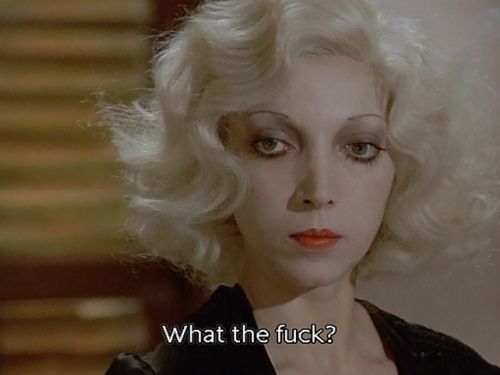De Palma's Women
Carrie White and the female characters of De Palma's horror
Ahead of the 40th anniversary screening of Carrie at the ICA, Anna Bogutskaya and Olivia Howe, co-directors of feminist film collective The Final Girls, explore the often problematic female characters in director Brian De Palma's films.
Misogynist, misanthrope, voyeur? With a career spanning four decades, Brian De Palma remains one of the most controversial directors in the history of cinema. Despite his success and his status as a great auteur, De Palma’s films have long been plagued by questions of voyeurism, objectification, pornography and violence directed at women.
Despite criticism [De Palma] isn’t one to shy away from the blurring of boundaries between voyeurism and pornography.
In 1984, the release of Body Double brought with it an onslaught of criticism from the media. Barry Norman, then-presenter of the BBC's weekly film review programme, claimed that De Palma had nothing better to do with his female characters than to treat them as objects subject to extreme violence. Critics argued that De Palma seemed to have an obsession with the idea of publicising the private elements of people’s lives – a theme that is certainly prominent in his earlier works Greetings (1968) and Hi Mom! (1970).
De Palma defends himself as being misunderstood in his art: artfully combining the suspense of Alfred Hitchcock with the operatic sensiblity of Italian gialli. The director certainly never seems to have been disconcerted by his critics or claims against his treatment of women – which have re-emerged in recent reappraisals of his work. His obsessions remain his obsessions, and despite criticism he isn’t one to shy away from the blurring of boundaries between voyeurism and pornography. As his own publicist, he has often been accused of being inflammatory in his marketing methods. His 1980 film Dressed to Kill was protested by female activists upon release, with claims of objectification and exorbitant violence toward women. Tellingly, the film concluded its London run at a cinema specialising in soft-core porn films. Despite criticisms, De Palma defends his approach, famously stating that:
"I'm always attacked for having an erotic, sexist approach – chopping up women, putting women in peril. I'm making suspense movies! What else is going to happen to them?"
In 1976, De Palma brought Carrie White to our cinema screens: a young girl tormented by a hyper-religious mother and subjected to bullying by the girls at her school. Based on the Stephen King novel, Carrie (played by Sissy Spacek), soon became De Palma’s most iconic female character. Contrary to of the arguably vacuous female characters who are slashed at will in many of De Palma’s films, Carrie White is a fully developed character in a story embedded in femininity and womanhood and largely unconcerned with the activity of male characters. Carrie’s victimisation by her peers, combined with her insecurities and anxieties, channel the teenage experience. When Carrie looks to the camera, wide-eyed, terrified, unaware of her own power, we are with her. But despite this, even Carrie has been the subject of much heated debate, with many suggesting that De Palma directly links female sexuality with sin and destruction. It is, after all, the point at which Carrie enters womanhood that her telekinetic powers appear.
In defiance of this criticism, De Palma holds his ground as one of the most prominent, prolific and obstinate filmmakers in history. While it would be difficult to suggest that his films do not carry a certain weight and controversy, aesthetically his filmmaking is unassailable. Decades after their release, many of his films remain groundbreaking in their style, characters, technique and writing – they are films that have gone on to influence the work of countless filmmakers. His output of work, though risky, remains intensely personal. Provocation too, has affirmed his stance and his status as a perpetual provocateur. De Palma clearly has a vision. A vision that no amount of criticism can disrupt. ■
The 40th anniversary screening of Carrie is organised in partnership with Mubi and is on at the ICA on 24 September.







